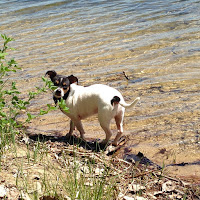 |
| Nothin' like lake memories... |
After Betsy Sholl’s
GENEALOGY
One of my parents was clay the other kelp.
One was a crawfish the other a rubberback turtle.
In the night I’d wake to cottonwood trees and the faint
One was a crawfish the other a rubberback turtle.
In the night I’d wake to cottonwood trees and the faint
smell of aluminum dock.
One of my parents was a speedboat, the other pontoon boat.
The splash tattooed on my lower back
is the one for lake water trying to dive.
One of my parents was sand,
the other a lily pad I carried into the night,
convinced it was sun-drenched.
One of my parents I plucked the other I floated.
In the revolving door of my becoming,
one swam, one jumped.
Thus, my troubled birth, my endless raft.
One was a bluegill the other a sunfish.
How they amused each other.
One was a submerged stump, the other a sand castle. I was ashamed
of not diving, embarrassed I couldn’t hold my breath.
I was a garter snake calling across the suntan oil to a swimsuit
I didn’t have.
The splash tattooed on my lower back
is the one for lake water trying to dive.
One of my parents was sand,
the other a lily pad I carried into the night,
convinced it was sun-drenched.
One of my parents I plucked the other I floated.
In the revolving door of my becoming,
one swam, one jumped.
Thus, my troubled birth, my endless raft.
One was a bluegill the other a sunfish.
How they amused each other.
One was a submerged stump, the other a sand castle. I was ashamed
of not diving, embarrassed I couldn’t hold my breath.
I was a garter snake calling across the suntan oil to a swimsuit
I didn’t have.
Not so great, but the idea is that you accidentally come into these very interesting combinations that you could work with in revision. The scaffolding idea actually tends to work really well, and at some point you allow yourself to make fundamental changes in the verse to fit your own purpose. The students had a set of readings to work with, including a poem called af.ter.glow (imagine dots instead of periods), which works in a dictionary definition format. I switched the word "afterglow" with the word "cenotaph" and ended up with this:
cen.o.taph
cen.o.taph\~\n 1. a
sepulchral moment esp. on Michigan trees after an ice storm: as in the
look of the amethyst sky against my mother's cenotaph. 2. The monument
standing after the disappearance of patience, as of an epoch or a
glacier, and sometimes regarded as an empty room: this whiskey on the
rocks, this bath of granite/ This cocktail of grief and fondness,/
This rumor of endless worry on a mother's forehead/ This Sunday
morning, this Christmas night,/ This metronome of my heart,/ This lotion
for my soul,/ This tremble from your memory/This frozen cheek, this
throne of icicles/Where you dab tissue to my lashes,/ Where we mourn
and, before 9 a.m., get back to work/ And I dream, mouth open/ jogging/
On this trail's booby trap of black ice.
Not bad for twenty minutes of work I suppose. I'll keep posting these as I have in the past, and there will be a lot of them, as I have converted to the "hypoxic" style of creative writing class, in which there is less workshopping and more actual writing. (Ironically, my comp classes are going to be more workshop-focused, as the Iowa workshop model may actually serve those students pretty well.)



No comments:
Post a Comment